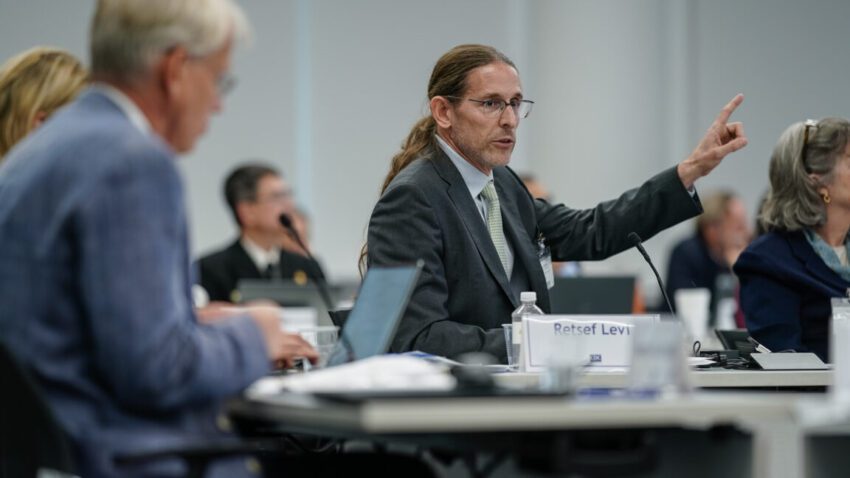
bonkers cdc vaccine meeting ends with vote A chaotic two-day federal vaccine advisory meeting concluded with a surprising unanimous vote to maintain broad access to COVID-19 vaccines, despite the tumultuous discussions that characterized the event.
bonkers cdc vaccine meeting ends with vote
Overview of the Meeting
The recent meeting, convened by the Centers for Disease Control and Prevention (CDC), was marked by confusion, heated debates, and unexpected outbursts. The advisory committee, which included members appointed by anti-vaccine activist Robert F. Kennedy Jr., faced a range of chaotic moments, including a hot mic incident where one participant was overheard saying, “you’re an idiot.” Such moments underscored the contentious atmosphere surrounding the discussions on COVID-19 vaccine access.
Key Outcomes of the Vote
Despite the disorder, the committee ultimately reached a unanimous decision, voting 12-0 to recommend that adults aged 65 and older, as well as individuals aged 6 months to 64 years with underlying health conditions, receive the COVID-19 vaccine. This recommendation is based on the principle of shared clinical decision-making, which emphasizes the importance of patient and provider discussions regarding vaccination.
Implications of the Vote
If the CDC adopts this recommendation, it will ensure that both federal and private health insurance plans continue to cover COVID-19 vaccines at no cost to patients. This is a significant development, as it maintains the accessibility of vaccines for vulnerable populations who may otherwise face financial barriers to vaccination.
Background on Vaccine Access and FDA Restrictions
Earlier this year, the Food and Drug Administration (FDA) implemented new restrictions on the approval of COVID-19 vaccines. Previously, vaccines were available to anyone aged 6 months and older. However, the FDA’s recent guidelines have limited access to vaccines for adults aged 65 and older and for younger individuals with specific underlying medical conditions that place them at high risk for severe COVID-19. This shift has raised concerns among public health officials and advocates about the potential for increased health disparities and the implications for community immunity.
Concerns About Vaccine Hesitancy
The meeting highlighted ongoing concerns regarding vaccine hesitancy, particularly among certain demographics. The involvement of anti-vaccine activists in the advisory committee has raised alarms about the potential influence on public health recommendations. Critics argue that such participation could undermine trust in vaccines and public health initiatives, further complicating efforts to combat misinformation and promote vaccination.
Reactions from Stakeholders
The reactions to the meeting and its outcomes have been mixed. Public health officials and advocates for vaccination have expressed relief at the unanimous vote, viewing it as a necessary step to ensure continued access to vaccines for at-risk populations. However, there is also a palpable concern regarding the chaotic nature of the discussions and the implications of having individuals with anti-vaccine sentiments involved in shaping public health policy.
Public Health Officials’ Perspectives
Many public health officials have emphasized the importance of maintaining access to COVID-19 vaccines, particularly as new variants of the virus continue to emerge. Dr. Anthony Fauci, former director of the National Institute of Allergy and Infectious Diseases, stated, “Vaccination remains one of our most effective tools in combating COVID-19, especially for vulnerable populations.” His remarks reflect a broader consensus among health experts regarding the necessity of vaccination in controlling the pandemic.
Community Responses
Community responses to the meeting have varied widely. Some individuals expressed frustration over the perceived chaos and lack of professionalism displayed during the discussions. Others, particularly those who have been directly affected by COVID-19, expressed gratitude for the continued access to vaccines. “It’s a relief to know that I can still get vaccinated without worrying about costs,” said one attendee who has a family member with underlying health conditions.
Future Considerations for Vaccine Policy
The outcome of the meeting raises important questions about the future of vaccine policy in the United States. As the pandemic evolves, public health officials will need to navigate the complexities of vaccine access while addressing the concerns of various stakeholders, including those who may be skeptical of vaccination.
Potential Changes in Vaccine Recommendations
As new variants of the virus emerge, there may be further changes to vaccine recommendations and guidelines. The CDC will need to remain adaptable and responsive to the evolving landscape of COVID-19. This includes considering booster shots, updated formulations of vaccines, and ongoing surveillance of vaccine effectiveness.
Engaging with Communities
Engaging with communities will be crucial in addressing vaccine hesitancy and ensuring that individuals understand the importance of vaccination. Public health campaigns that emphasize education and outreach will be essential in fostering trust and encouraging vaccination among hesitant populations. This may involve partnerships with community organizations, healthcare providers, and local leaders to disseminate accurate information about vaccines.
Conclusion
The recent CDC vaccine advisory meeting, despite its chaotic nature, concluded with a critical decision to maintain access to COVID-19 vaccines for vulnerable populations. As the pandemic continues to evolve, the importance of vaccination remains paramount in safeguarding public health. The unanimous vote serves as a reminder of the ongoing challenges and complexities surrounding vaccine policy, and the need for continued dialogue and engagement with communities to promote vaccination and combat misinformation.
Source: Original report
Was this helpful?
Last Modified: September 20, 2025 at 3:36 am
0 views















